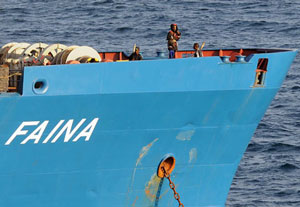Somali piracy connected to toxic dumping, illegal fishing
Orginally posted: Nov 20, 2008
While CNN, FOX, Times and other corporate media sources have fixated on one-dimensional reporting of the “Somalia Piracy” story, some diligent reporters and outlets have reported the broader picture. The following article and attached video offers that broader picture.

UNITED NATIONS (FinalCall.com) – The head of the UN’s body charged with combating piracy has advocated establishing a UN force to fight the piracy problem off Somalia’s coast–but the problem may be more complex than simple banditry on the high seas.
According to the UN secretary-general’s spokesman’s office, Secretary-General of the International Maritime Bureau Efthimios Mitropoulos said the Gulf of Aden, the gateway to the vital Suez Canal, and the eastern coast of Somalia rank as the world’s top piracy hot spots. The Gulf of Aden accounted for a third of all attacks on ships in the first nine months of 2008, said Mr. Mitropoulos. Thousands of cargo ships and tankers pass through on their way to Mombasa port in Kenya or destinations in southern Africa.
While the hijackings have been described as the work of criminals, officials admit the problem of waste dumped off the coast of Somalia may be a reason why ships have been commandeered.
In September, a Ukrainian freighter with Russian tanks on board, anti-aircraft guns and heavy weaponry was seized by Somali pirates and ransom negotiations are ongoing.
A spokesman for the pirates, who reportedly use the autonomous region of Puntland as their base, told Al Jazeera some of the ransom money will be used to help clean up waters off the Somali coast ravaged by years of toxic waste dumping. The ransom demand is a means of “reacting to the toxic waste that has been continually dumped on the shores of our country for nearly 20 years,” the spokesman said.
Ahmedou Ould-Abdallah, the UN special envoy for Somalia, said the world body had “reliable information” that European and Asian companies are responsible for the dumping. The United Nations has also been told that some Somali pirates claim to act as “coast guards,” protecting their country’s waters, he added.
“This is not something new, the accusation that toxic dumping is happening off the shores of Somalia, it is amazing though that it is now coming out,” said Sadia Aden, president of the Somalia Diaspora Network. “Opinions are mixed on the pirates. Some of the people are saying the pirates are defending our territory,” Ms. Aden told The Final Call.
A political solution in Somalia would solve the piracy problem, said Ms. Aden. “We need elections. We need a central government,” she argued.
Somalia has not had a central government since 1991 when late President Mohamed Siad Barre was ousted.
Analysts said the chaotic state of the Transitional Federal Government has meant no binding trade measures are in affect and Somalia has not signed the Basel Convention or the Bamako Convention, which ban the import of hazardous waste to African nations.
“While I know the subject of this interview is waste dumping in Somalia, I must say that toxic dumping is an issue all over West and East Africa,” said Nii Akuetteh, executive director of Africa Action, a member of the Scholars’ Council at Trans Africa Forum and founder of the Democracy and Conflict Research Institute in Accra, Ghana.
“The Somali toxic waste dumping issue is of great concern to me because it spills over to other African nations,” Mr. Akuetteh said. “Did you know that when the Islamic Courts Union was in charge of Somalia, piracy had come to a virtual halt? But thanks to the Bush administration and Ethiopia after the ouster of the ICU in 2006, the phenomenon returned,” said Mr. Akuetteh.
In early October, the UN Security Council unanimously passed Resolution 1838 (2008) which determined “that the incidents of piracy and armed robbery against vessels in the territorial waters of Somalia and the high seas off the coast of Somalia exacerbate the situation in Somalia which continues to constitute a threat against international peace and security.”
“The UN must monitor more closely the toxic waste issue; and there doesn’t seem to be any mention of that in Resolution 1838,” observed Professor Abdi Ismail Samatar, of the geography and global studies department at the University of Minnesota, in a Final Call interview.
While the media is covering piracy, there needs to be coverage of the plundering of Somali resources by rich companies and rich governments, said Prof. Samatar. “They are destroying the coral reefs–breeding grounds for the fisheries–destroying the livelihoods of Somalis, taking the food out of the mouths of the poor.”
According to Ms. Aden there are 3.5 million Somalis facing starvation. East African waters, particularly off Somalia, have huge numbers of commercial fish, including the prized yellow-fin tuna. Observers say the Somali coastline once sustained hundreds of thousands of people as a source of food and livelihoods.
Related links:
- Somalia: a clear case of ‘blood oil’ in Africa (FCN, 02-05-2007)
- Reconnecting the international struggles of Black people (FCN, 07-26-2006)
- The Oil Factor In Somalia (LA Times, 01-18-1993)












